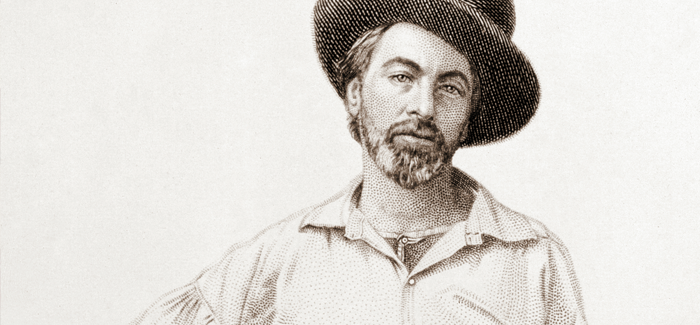
Walt Whitman at ease on the cover of poet Peter O’Leary’s copy of Leaves of Grass. (Detail from a steel engraving by Samuel Hollyer from a lost daguerreotype made by Gabriel Harrison, {PD})
UChicago creative writers offer a few words about reading.
There aren’t enough red plastic chairs in the Seminary Co-op to seat all the listeners who have assembled on a blustery Humanities Day for a talk titled “How Writers Read.” I’m relegated to standing at the back of the crowd as we listen to the faculty of UChicago’s creative writing program discuss some of their literary touchstones.
First, poet Peter O’Leary, AB’90, AM’94, PhD’99, discusses his love for Walt Whitman’s “Song of Myself,” a poem he read in an undergrad Fundamentals class in 1989. Twenty-four years later, his affection still holds: O’Leary’s book of poetry, The Phosphorescence of Thought, is 1,336 lines long, the same length as Whitman’s poem.
O’Leary points to the cover of his copy of Leaves of Grass, where a daguerreotype shows Whitman with hand on hip and hat askew, a casual attitude that O’Leary refers to throughout his talk. After reciting the first five lines, he fixes on Whitman’s spelling of “loafe,” the extra letter added to resonate with the word “ease.” These typographical quirks, O’Leary says, “signify the poet loafing into language, finding this relaxed pose.”
Vu Tran, a short story writer, has chosen Anton Chekhov’s “The Lady with the Dog,” a story that Nabokov praised as “one of the greatest ever written.” As an undergraduate, Tran was less effusive—he found the story cloying, hackneyed, theatrical. “Too Russian,” he says, and the audience chuckles.
In the story, the caddish Gurov begins an affair with Anna, a girl half his age. Tran points us to Chekhov’s use of the third person, which allows us to see Gurov as selfish and manipulative before he gets a clue. Eventually, Gurov realizes that he’s fallen for Anna and accepts the complications that result from these feelings. “As a more mature reader,” Tran tells us, “what I had taken for melodrama now strikes me as honest self-awareness, rife with ambiguity and pain that I wasn’t privy to when I was young.”
Poet and translator Jennifer Scappettone turns to Amelia Rosselli, a 20th-century poet whose work she translated from the original Italian. To illustrate the translator’s task, Scappettone shows us Rosselli’s shortest poem—“Cercatemi e fuoriuscite”—which she has translated as “Seek me and banish.” Rosselli uses “fuoriuscite” as a command, though it’s usually an adjective that carries the sense of political exile. These are the nuances Scappettone had to consider before settling on the word “banish.”
How writers read: with eloquence, and finesse.
